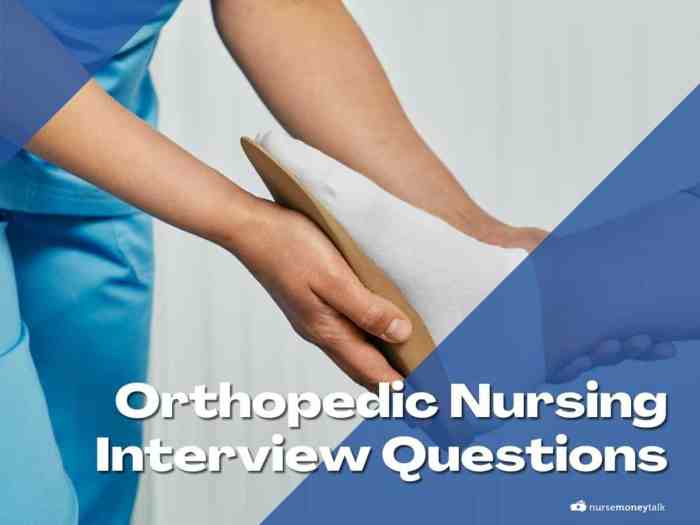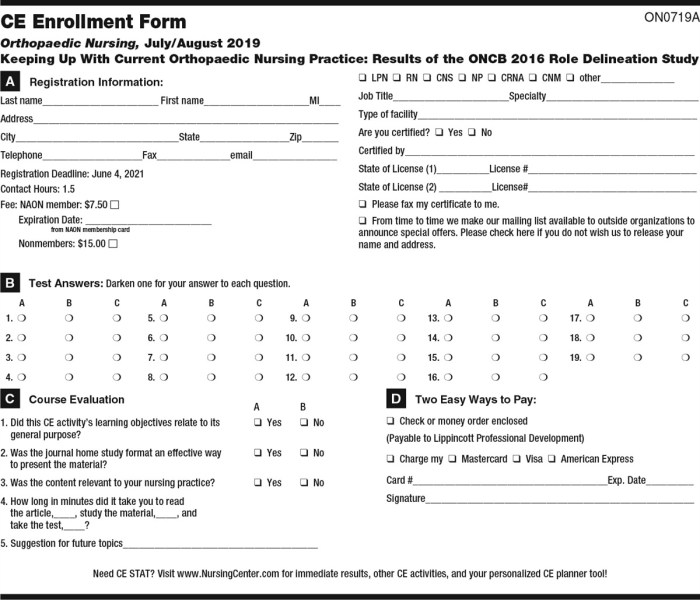Delving into the intricacies of orthopedic nursing exam questions pdf, this comprehensive guide provides a roadmap to success, empowering nurses with the knowledge and strategies to excel in their certification endeavors. With its authoritative tone and engaging narrative, this resource offers an in-depth exploration of exam content, preparation techniques, and essential study materials.
Orthopedic nursing exam questions pdf serves as an indispensable tool for nurses seeking to validate their expertise in the specialized field of orthopedic care. By understanding the purpose and significance of this exam, nurses can effectively prepare and demonstrate their proficiency in providing exceptional patient care.
Orthopedic Nursing Exam Overview
The orthopedic nursing exam is a specialized examination that assesses the knowledge and skills of nurses in the field of orthopedics. It is designed to ensure that nurses have the necessary expertise to provide high-quality care to patients with orthopedic conditions.
There are different types of orthopedic nursing exams, including:
- Certified Orthopedic Nurse (ONC) Exam
- Orthopedic Clinical Nurse Specialist (OCNS) Exam
- Orthopedic Trauma Nurse (OTN) Exam
These exams cover a wide range of topics, including:
- Musculoskeletal anatomy and physiology
- Orthopedic assessment and diagnosis
- Orthopedic surgical procedures
- Post-operative care
- Rehabilitation
- Review relevant textbooks and study materials.
- Attend continuing education courses and workshops.
- Practice answering sample questions.
- Develop a study schedule and stick to it.
- Seek support from colleagues and mentors.
- Active recall: Trying to recall information from memory without looking at notes.
- Spaced repetition: Reviewing material at increasing intervals to improve retention.
- Chunking: Breaking down large amounts of information into smaller, manageable pieces.
- Musculoskeletal anatomy and physiology
- Orthopedic assessment and diagnosis
- Orthopedic surgical procedures
- Post-operative care
- Rehabilitation
- Pharmacology
- Ethics and legal issues
- Describe the anatomy of the knee joint.
- Explain the function of the rotator cuff muscles.
- Describe the signs and symptoms of a meniscus tear.
- Explain the diagnostic criteria for osteoporosis.
- Describe the steps involved in a total knee replacement.
- Explain the indications for spinal fusion surgery.
- Describe the nursing care plan for a patient after an ACL reconstruction.
- Explain the importance of pain management after orthopedic surgery.
- Describe the goals of physical therapy after a hip replacement.
- Explain the role of occupational therapy in orthopedic rehabilitation.
- Time management: Allocate time wisely to each question.
- Question selection: Focus on answering questions that you are confident about first.
- Answer elimination: Eliminate obviously incorrect answer choices.
- Educated guessing: If you are unsure about an answer, make an educated guess based on the information provided.
- Read the question carefully and identify the key words.
- Eliminate answer choices that are irrelevant or do not match the question.
- Consider the context of the question and apply your knowledge of orthopedic nursing.
- Textbooks: Orthopedic Nursing by Lippincott Williams & Wilkins, Orthopaedic Nursing: A Guide to Practice by Elsevier
- Online courses: Orthopedic Nursing Review Course by Kaplan, Orthopaedic Nursing Exam Preparation by Pass the Boards
- Practice tests: Orthopedic Nursing Practice Test by National League for Nursing, Orthopaedic Nursing Exam Simulator by Exam Edge
Preparation for the Exam

Preparing for the orthopedic nursing exam requires a comprehensive approach. Nurses should:
Effective study strategies include:
Exam Content and Structure

The orthopedic nursing exam typically consists of multiple-choice questions that cover the following content areas:
The exam may also include case studies or simulations to assess the nurse’s clinical judgment and problem-solving skills.
Common Exam Questions: Orthopedic Nursing Exam Questions Pdf

Common orthopedic nursing exam questions include:
Musculoskeletal Anatomy and Physiology, Orthopedic nursing exam questions pdf
Orthopedic Assessment and Diagnosis
Orthopedic Surgical Procedures
Post-Operative Care
Rehabilitation
Exam Strategies and Techniques

Effective exam strategies include:
Additional techniques include:
Resources and Study Materials
Numerous resources are available to help nurses prepare for the orthopedic nursing exam, including:
Joining professional organizations such as the American Association of Orthopaedic Nurses (AAON) and attending conferences and webinars can also provide valuable resources and support.
Common Queries
What is the purpose of the orthopedic nursing exam?
The orthopedic nursing exam assesses a nurse’s knowledge and skills in providing specialized care to patients with musculoskeletal conditions.
How do I prepare for the orthopedic nursing exam?
Effective preparation involves studying the exam blueprint, utilizing practice questions, and engaging in collaborative learning activities.
What are common topics covered in the orthopedic nursing exam?
Exam content typically includes anatomy and physiology, assessment techniques, surgical interventions, pain management, and rehabilitation principles.
Where can I find study materials for the orthopedic nursing exam?
Study materials such as textbooks, online courses, and practice tests are available from various sources, including professional organizations and educational institutions.